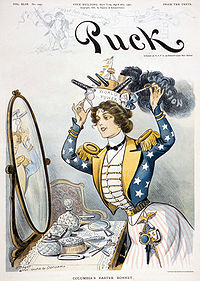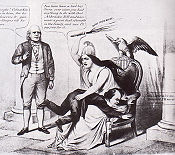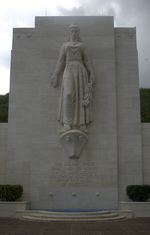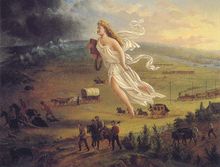- Columbia (name)
-
For other uses, see Columbia (disambiguation) and British Columbia.
 Personified Columbia, from a World War I patriotic poster.
Personified Columbia, from a World War I patriotic poster.
Columbia (
 /kəˈlʌmbiə/; kə-lum-bee-ə) is an historical and poetic name for America – and the early United States of America in particular, for which it is also the name of its female personification. It has inspired the names of many persons, places, objects, institutions, and companies in the Americas and beyond.
/kəˈlʌmbiə/; kə-lum-bee-ə) is an historical and poetic name for America – and the early United States of America in particular, for which it is also the name of its female personification. It has inspired the names of many persons, places, objects, institutions, and companies in the Americas and beyond.Contents
Etymology
Columbia is a New Latin toponym, combining a stem Columb- based on the surname of the explorer Christopher Columbus and an ending -ia, common in Latin names of countries (e.g. Britannia "Britain", Gallia "Gaul"). The meaning is therefore "Land of Columbus."
History
 Columbia wearing a warship bearing the words "World Power" as her "Easter bonnet" (cover of "Puck", April 6, 1901).
Columbia wearing a warship bearing the words "World Power" as her "Easter bonnet" (cover of "Puck", April 6, 1901).
The name Columbia for "America" (in the sense of "European colonies in the New World") first appeared in 1738[1][2] in the weekly publication of the debates of the British Parliament in Edward Cave's The Gentleman's Magazine. Publication of Parliamentary debates was technically illegal, so the debates were issued under the thin disguise of Reports of the Debates of the Senate of Lilliput, and fictitious names were used for most individuals and placenames found in the record. Most of these were transparent anagrams or similar distortions of the real names; some few were taken directly from Jonathan Swift's Gulliver's Travels; and a few others were classical or neoclassical in style. Such were Ierne for Ireland, Iberia for Spain, Noveborac for New York (from Eboracum, the Roman name for York), and Columbia for America—at the time used in the sense of "European colonies in the New World".[3]
The name appears to have been coined by Samuel Johnson, thought to have been the author of an introductory essay (in which "Columbia" already appears) which explained the conceit of substituting "Lilliputian" for English names; Johnson also wrote down the Debates from 1740 to 1743. The name continued to appear in The Gentleman's Magazine until December 1746. Columbia is an obvious calque on America, substituting the base of the surname of the discoverer Christopher Columbus for the base of the given name of the somewhat less well-known Americus Vespucius.
As the debates of Parliament, many of whose decisions directly affected the colonies, were distributed and closely followed in the British colonies in America, the name "Columbia" would have been familiar to the United States' founding generation.
In the second half of the 18th century, the American colonists were beginning to acquire a sense of having an identity distinct from that of their British cousins on the other side of the ocean. At that time, it was common for European countries to use a Latin name in formal or poetical contexts to confer an additional degree of respectability on the country concerned.[4] In many cases, these nations were personified as pseudo-classical goddesses named with these Latin names. The use of "Columbia" was, in effect, the closest which the Americans, located in a continent unknown to and unnamed by the Romans, could come to emulating this custom.
By the time of the Revolution, the name Columbia had lost the comic overtone of its "Lilliputian" origins and had become established as an alternative, or poetic name for America. While the name America is necessarily scanned with four syllables, according to 18th-century rules of English versification Columbia was normally scanned with three, which is often more metrically convenient. The name appears, for instance, in a collection of complimentary poems written by Harvard graduates in 1761, on the occasion of the marriage and coronation of King George III.[5]
- Behold, Britannia! in thy favour'd Isle;
- At distance, thou, Columbia! view thy Prince,
- For ancestors renowned, for virtues more;[6]
The name "Columbia" rapidly came to be applied to a variety of items reflecting American identity. A ship built in Massachusetts in 1773, received the name Columbia; it later became famous as an exploring ship, and lent its name to new "Columbias."
No serious consideration was given to using the name Columbia as an official name for the independent United States,[citation needed] but with independence the name became popular and was given to many counties, townships, and towns, as well as other institutions, e.g.:
- In 1784, the former King's College in New York City had its name changed to Columbia College, which became the nucleus of the present-day Columbia University.
- In 1786, just before the United States' Constitutional Convention, South Carolina gave the name "Columbia" to its new capital city. Columbia is also the name of at least nineteen other towns in the United States.
- In 1791, three commissioners appointed by President Washington named the area destined for the seat of the U.S. government "the Territory of Columbia"; it was subsequently (1801) organized as the District of Columbia.
- In 1792, the Columbia Rediviva sailing ship gave its name to the Columbia River in the American Northwest.
- In 1798, Joseph Hopkinson wrote lyrics for Philip Phile's 1789 inaugural "President's March" under the new title of "Hail, Columbia." Once used as de facto national anthem of the United States, it is now used as the entrance march of the Vice President of the United States.
In part, the more frequent usage of the name Columbia reflected a rising American neoclassicism, exemplified in the tendency to use Roman terms and symbols. The selection of the eagle as the national bird, the use of the term Senate to describe the upper house of Congress, and the naming of Capitol Hill and the Capitol building were all conscious evocations of Roman precedents.
The adjective Columbian has been used to mean "of or from the United States of America", for instance in the World's Columbian Exposition of 1893, held in Chicago, Illinois. Occasionally proposed as an alternative word for "American", Columbian has not re-entered general English use. It should not be confused with the adjective "Pre-Columbian", referring to a time period before the arrival of Christopher Columbus and other European explorers in the Americas.
After the World Wars, the personification of Columbia fell out of use, and she has largely been replaced by Lady Liberty as a feminine allegory of the United States.
Personification
As a quasi-mythical figure, Columbia first appears in the poetry of African-American Phillis Wheatley starting in 1776 during the revolutionary war:
- One century scarce perform'd its destined round,
- When Gallic powers Columbia's fury found;
- And so may you, whoever dares disgrace
- The land of freedom's heaven-defended race!
- Fix'd are the eyes of nations on the scales,
- For in their hopes Columbia's arm prevails.[7]
Especially in the 19th century, Columbia would be visualized as a goddess-like female national personification of the United States, comparable to the British Britannia, the Italian Italia Turrita and the French Marianne, often seen in political cartoons of the 19th-early 20th century. This personification was sometimes called "Lady Columbia" or "Miss Columbia".
The image of the personified Columbia was never fixed, but she was most often presented as a woman between youth and middle age, wearing classically draped garments decorated with the stars and stripes; a popular version gave her a red-and-white striped dress and a blue blouse, shawl, or sash spangled with white stars. Her headdress varied; sometimes it included feathers reminiscent of a Native American headdress, sometimes it was a laurel wreath, but most often it was a cap of liberty.
Statues of the personified Columbia may be found in the following places:
- The 1863 Statue of Freedom atop the United States Capitol building, though not actually called "Columbia", shares many of her iconic characteristics.
- Atop Philadelphia's Memorial Hall, built 1876
- The replica Statue of the Republic ("Golden Lady") in Chicago's Jackson Park is often understood to be Columbia. It is one of the remaining icons of the 1893 World's Columbian Exposition.
- In the National Memorial Cemetery of the Pacific, dedicated 1949.
Modern appearances
 Political cartoon from 1860 depicting Stephen A. Douglas receiving a spanking from Columbia as Uncle Sam looks on approvingly.
Political cartoon from 1860 depicting Stephen A. Douglas receiving a spanking from Columbia as Uncle Sam looks on approvingly.
Since 1800, the name Columbia has been used for a wide variety of items:
- Columbia University, a university in the New York City, which first adopted the name 'Columbia College' in 1784.
- The song "Columbia, Gem of the Ocean" (1843) commemorates the United States under the name Columbia.
- Columbia Records, founded in 1888, took its name from its headquarters in the District of Columbia.
- Columbia Pictures, named in 1924, uses a version of the personified Columbia (the so-called "Torch Lady") as its logo.
- CBS's former legal name was the Columbia Broadcasting System, first used in 1928. The name derived from an investor, the Columbia Phonographic Manufacturing Company, owner of Columbia Records.
- The Command Module of the Apollo 11 spacecraft, the first manned mission to land on the Moon, was called Columbia (1969).
- The Space Shuttle Columbia, built 1975-1979, was named for the exploring ship Columbia.
- A personified Columbia appears in Uncle Sam, a graphic novel about American history (1997).
See also
In this painting (circa 1872) by John Gast, called American Progress, Columbia, in the implementation of Manifest Destiny, leads civilization westward with American settlers; the book is a school book, not a Bible.
- The goddess Liberty
- Britannia, the equivalent symbol for Britain
- Goddess of Democracy
- Marianne, the equivalent symbol for France¨
- Germania, The equivalent symbol for Germany
- Statue of Liberty
- Uncle Sam
- World's Columbian Exposition
Notes
- ^ The Gentleman's Magazine, Vol. 8, June 1738, p. 285
- ^ Proceedings of the Massachusetts Historical Society, Dec. 1885, pp. 159-165
- ^ Debates in Parliament, Samuel Johnson.
- ^ E.g. "Gallia" for France, "Helvetia" for Switzerland, "Lusitania" for Portugal, "Caledonia" for Scotland, "Hibernia" for Ireland, "Polonia" for Poland etc.
- ^ Hoyt, Albert. The Name 'Columbia' , The New England Historical & Genealogical Register, July 1886, pp. 310-313.
- ^ Pietas et Gratulatio Collegii Cantabrigiensis apud Novanglos, no. xxix. Boston, Green and Russell, 1761.
- ^ Selections from Phillis Wheatley Poems and Letters
References
- George R. Stewart. Names on the Land. Houghton Mifflin Company: Boston (1967).
External links
National personifications - Argentina
- Effigies of Argentina
- Armenia
- Mother Armenia
- Brazil
- Efígie da República
- Cambodia
- Preah Thong and Neang Neak
- Canada
- Johnny Canuck
- Finland
- Finnish Maiden (Suomi-neito)
- France
- Marianne
- Georgia
- Kartlis Deda
- Germany
- Deutscher Michel
- Germania
- Greece
- Athena
- "Greece" of Delacroix
- Iceland
- Lady of the Mountain
- India
- Bharat Mata
- Indonesia
- Ibu Pertiwi
- Ireland
- Ériu
- Hibernia
- Kathleen Ni Houlihan
- Israel
- Srulik
- Italy
- Italia Turrita
- Japan
- Amaterasu
- Malaysia
- Ibu Pertiwi
- Netherlands
- Netherlands Maiden
- New Zealand
- Zealandia
- Norway
- Ola Nordmann
- Pakistan
- Pak Watan
- Philippines
- Juan dela Cruz
- Maria Clara
- Poland
- Polonia
- Portugal
- Efígie da República
- Zé Povinho
- Russia
- Mother Russia
- Spain
- Hispania
- Sweden
- Mother Svea
- Switzerland
- Helvetia
- Ukraine
- Cossack Mamay
- United Kingdom
- Britannia
- John Bull
- Dame Wales
- United States
- Brother Jonathan
- Columbia
- Lady Liberty
- Uncle Sam
- Billy Yank
- Johnny Reb
Categories:- National personifications
Wikimedia Foundation. 2010.



